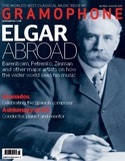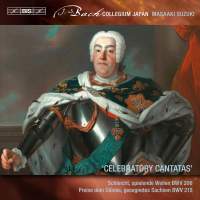Texte paru dans: / Appeared in: |
|
 |
Outil de traduction (Très approximatif) |
|
Reviewer:
Jonathan Freeman-Attwood
Richly detailed nuances in scoring and melodic character emerge in these dedicatory works, in this case a panegyric for Elector August II, where investment of creative energy and resources might still bring the composer reputational dividends. So Bach brings, as ever, a loftier meaning to the usual insipid commissioned texts. Schleicht, spielende Wellen (‘Flow, playful waves and murmur’) follows the dramma per musica template of allegory – this time with four competing rivers yearning for the primacy of the monarch’s affections. However ludicrous, Bach constructs a very significant work which Suzuki treats as an undertaking of serious critical engagement. Both the gentleness and ecstatic immediacy of Bach’s rich imagery become apparent at the outset and each movement is performed at a compellingly high level. The liquid and brilliantly projected bass-singing of Roderick Williams is simply majestic in ‘Schleuss des Janustempels Türen’. The pure gold lies at the end when the River Pleisse, sung by the bright but deeply responsive soprano Hana Blažíková, requests each river to act its age ‘with undivided concord and sweet harmony’. The ‘choir’ of three flutes, each with their dovetailing and courtly roulades, does the trick. The voicing of this late Bach canvas is simply exquisite.
Preise dein Glücke
is no less strikingly delivered, again an Augustian homage but with more of a
consistently extrovert swagger. There’s a grand ‘rage’ aria – Williams again in
his element – but the pièce de résistance is Bach’s party piece of
unalloyed sycophancy, the tenor aria ‘Freilich trotzt Augustus’ Name’ (whose
name speaks of noble lines of gods and defying mortality, no less!). Tenor
Charles Daniels may not have the glorious bounce or spontaneous timbral
gear-shifts of the young Ian Partridge for Ernest Ansermet but his reading is
full of delights and the coloratura as exemplary as ever. After 22 years of
intensive Bach recording, Suzuki and his forces just seem to get better. |
|




